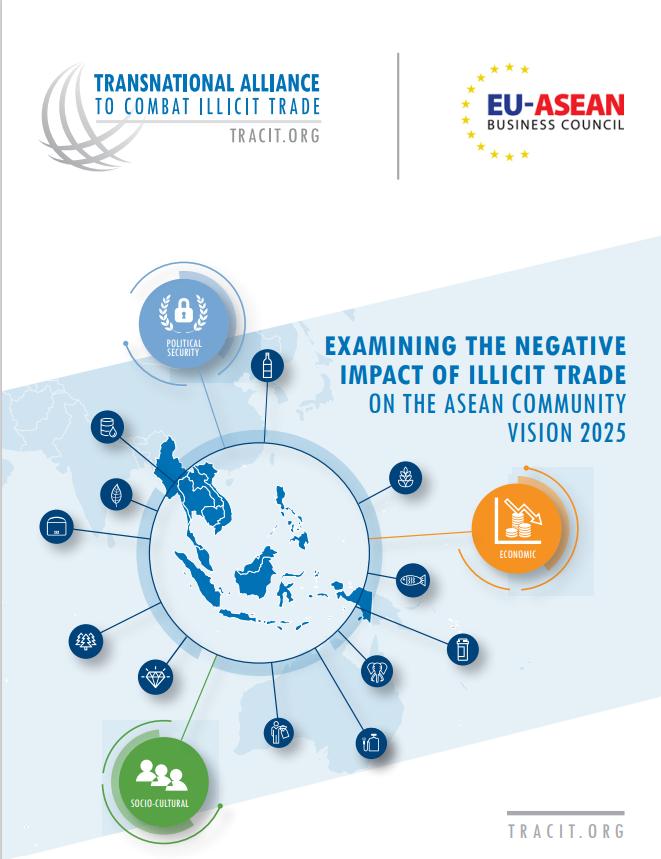Illicit tobacco trade threatens Asean economies, 2025 vision–report says

Image: EU-Asean Business Council / Tracit.org
MANILA, Philippines – Illicit trade threatens the economies of the Association of Southeast Asian Nations (Asean) and could derail its goal of regional integration by 2025, according to a new report.
“Mapped against Asean’s three communities [political-security, economy, and socio-cultural], the threat of illicit trade to derail the objectives of Vision 2025 is unmistakable,” the report by the Transnational Alliance to Combat Illicit Trade (TRACIT) and the EU-Asean Business Council said. The Asean set an ambitious goal to achieve economic integration by 2025.
Asean governments lost $2.9 billion in tax revenue from illicit tobacco products alone in 2017. The Philippines, for example, loses an estimated P100 billion ($1.9 billion) annually due to cigarette tax evasion.
The 94-page report details the negative effects of illicit trade on economic growth, investment, job creation, crime prevention, and environmental protection in the region.
Illicit trade often involves counterfeit or substandard goods, posing consumer safety risks. The report highlights tobacco smuggling as a particular concern. While 10 percent of cigarettes consumed globally are illicit, the rate jumps to 15 percent in 16 Asian countries, including Asean members.
Article continues after this advertisement“The concentration of illicit cigarette consumption is most prominent in Indonesia, Malaysia, the Philippines, and Vietnam, which collectively accounted for about 95 percent of the region’s total illicit consumption in 2017,” the TRACIT report said.
“Cigarettes manufactured within Asean countries are smuggled to other Asean countries, Asia-Pacific countries, and other global markets. For example, there are massive outflows of illicit whites and counterfeits smuggled from Vietnam and Cambodia to Europe. Exports or transshipments from Indonesia and Singapore are also significant,” it said.
“Cigarettes are exported from Indonesia to several countries in the region, predominantly the Philippines, through ports such as Nunukan and Tarakan. The brands declared for export to the Philippines are often not registered with the Philippines’s Bureau of Internal Revenue—a mandatory requirement for cigarettes to be sold legally in the country. Further, the Philippines also receives large volume of imports from Vietnam, Cambodia, and India that transit through Singapore,” it said.
“In Thailand, brands exported from Vietnam and Indonesia and that appear to have consignees based in Singapore, Hong Kong, Malaysia, and the United Arab Emirates are likely considered goods in transit which receive less scrutiny by Customs,” it said.
While most attention focuses on illicit cigarettes, the report warns that other tobacco products, like smokeless tobacco, are also vulnerable. The ban on e-cigarettes in Singapore and Thailand has led to increased smuggling of illicit vaping products from neighboring Malaysia, a major e-cigarette producer.
“This is also the trend in the Philippines, where there has been a surge in illicit vaping products. In response, the Department of Trade and Industry recently directed Shopee and Lazada to remove more than one million listings of illicit vaping products,” it said.
The TRACIT report said illicit trade undermines Asean’s political-security community, weakens the economic community by hindering economic growth, and threatens the socio-cultural community by harming the environment and being linked to human trafficking and forced labor.
READ: Gov’t losing billions in tax revenues from illicit tobacco trade, says BIR chief
“Since international trade and investment are critical elements of the Community Vision 2025, it will be paramount for Asean leaders to ensure that illicit trade does not derail the vision’s objectives to drive sustainable economic development, boost income generating capacity, job creation, reduce poverty and achieve better standards of living throughout the region,” it said.
The report cites the need for sustained political will from governments at all levels to prioritize the problem, develop solutions, and invest in enforcement measures.
